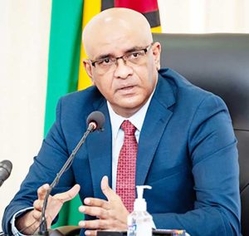Nov 08, 2021
…raises red flag over technocrat signing loan request to China instead of Finance Minister
Kaieteur News – Former Finance Minister Winston Jordan, has expressed grave concerns over Guyana’s borrowing spree and he also questioned the legality of a letter sent to the Chinese ambassador regarding a loan request of US$1.5B, which he said was signed by a finance ministry official instead of the subject minister who according to Section 58(1) of the Fiscal Management and Accountability Act 2003 (FMAA), has the sole authority to borrow on behalf of the Government of Guyana.
In a letter to the editor of this newspaper, Jordan said that he had begun to hear rumours, around March, about the government’s approach to China for loans totalling US$1.5 billion, to finance various infrastructure projects.
“What I found to be astonishing was that the letter to the Chinese Ambassador, requesting the loan, was signed by a senior official of the Ministry of Finance and copied to the President, Vice President, the Senior Minister in the Office of the President with responsibility for Finance, among others. Section 58(1) of the Fiscal Management and Accountability Act 2003 (FMAA) reposes in the Minister of Finance the sole authority to borrow on behalf of the Government of Guyana,” Jordan wrote.
At a news conference last week Vice President Bharrat Jagdeo confirmed his government’s approach to the Chinese for the US$1.5B loan. When questioned he said: “We made it clear to everyone. No financing from anybody comes with political strings but Chinese financing has been readily available to the world and we believe, like the rest of the region, we have to explore friends and partners from every part of the world.”
Jagdeo also spoke about the government trying to access 103 million Euros from Austria for the construction of a children and maternal hospital, but Guyana would have had to deduct 13 million Euros immediately as an “upfront fee” and repay that along with the requirement to use one of their pre-approved contractors. He said India and the United States stipulate that contractors from those countries be used.
Meanwhile, Jordan said that the 2021 Mid-Year Report records the stock of public debt as $2.905 billion. This, he said can easily rise to $5.3 billion within a few years, if one were to factor in the $1.5 billion from China and the undrawn $0.9 billion from the Islamic Development Bank. “It becomes even starker when one considers: i. the burgeoning overdraft of the Consolidated Fund; ii. borrowing from traditional sources, such as World Bank, IDB and CDB; and iii. new sources of borrowing, such as the Sovereign Wealth Funds of the United Arab Emirates and Kuwait. All of this borrowing is taking place, ostensibly, to fulfill manifesto promises, regardless of how implausible many of them appear to be.” Jordan said the repayment of these loans is premised on future oil receipts coming to the government. “In this regard, however, the experience of Ghana is most instructive and the government should avail itself of the lessons learnt.
Jordan said too that borrowing at a concessionary rate as low as 2%, although it makes sense will only work providing that the projects being financed guarantee a return greater than the cost of borrowing. “Since moneys are accumulating in the Natural Resource Fund (NRF), then it makes sense to finance a project by borrowing at 2%, once the returns on the NRF’s funds are greater than 2%. But here is a reality check: first, the funds in the NRF are earning almost zero return because the government refuses to activate the Investment Committee, among the other Committees of the NRF,” Jordan said.
He said too that it is unlikely that the $1.5 billion loan from China can be secured at an interest rate of 2%. “I say this based on previous attempts by a PPP/C government to secure funding from China for the Amaila Falls Hydropower Project (AFHP). A major sticking point during the negotiations was the interest rates on the two major loans that were to be provided by the two Chinese funding institutions. These interest rates were far in excess of 2%.
The Kaieteur News reported last week that according to the mid-year financial report, disbursements from the Inter-American Development Bank (IDB) increased 10-fold, from US$5.2 million in the first half of 2020, to about US$55.5 million for the corresponding period in 2021.
According to the report, about 75.2 percent of the latter amount was allocated to combating the economic and social ramifications of the pandemic. The report was at the time addressing the nation’s total debt stock and explained that the increase “was largely due to positive net flows (disbursements less principal repayments) from the IDB, driven by disbursements, under two loan agreements geared at combating the COVID-19 pandemic.”
According to the report, at the end of June 2021, multilateral creditors held 64.2 percent of external Public and Publicly Guaranteed (PPG) debt, bilateral creditors 33.4 percent, and private creditors 2.4 percent. Projecting forward, the report states that the external PPG debt stock is projected to increase by 3.9 percent from its mid-year position, to US$1,407.5 million at the end of 2021, mainly driven by disbursements under several IDB funded projects.Detailing the borrowing, the report reflected that in the first half of 2021, disbursements from external creditors amounted to US$61.6 million, more than three times that in the first half of 2020. To this end, it was explained that “this increase reflects higher disbursements from multilateral creditors, moving from US$10.3 million in the first half of 2020, to US$60.8 million in the first half of this year.”Meanwhile, as key projects approached completion, the report highlighted that bilateral disbursements totalled US$0.8 million in the first half of the year, 89.1 percent lower than US$7.3 million during the same period of 2020.
Meanwhile, as it relates to domestic PPG debt, the report documents that, at the end of the first half of the year, this amounted to US$1,552.6 million, a 22.1 percent increase from the end of 2020 figure of US$1,271.4 million. It was noted too that in June 2021, government securitised the inherited overdraft at the Bank of Guyana using 85 variable-rate debentures, with tenors ranging from 1 to 20 years, totalling G$200 billion (about US$959.2 million). “Consequently, the first half of 2021 ended with the Consolidated Fund, as well as public deposits, reflecting a positive balance.”





 Finance Minister Dr Ashni Singh and former Finance Minister Winston Jordan
Finance Minister Dr Ashni Singh and former Finance Minister Winston Jordan